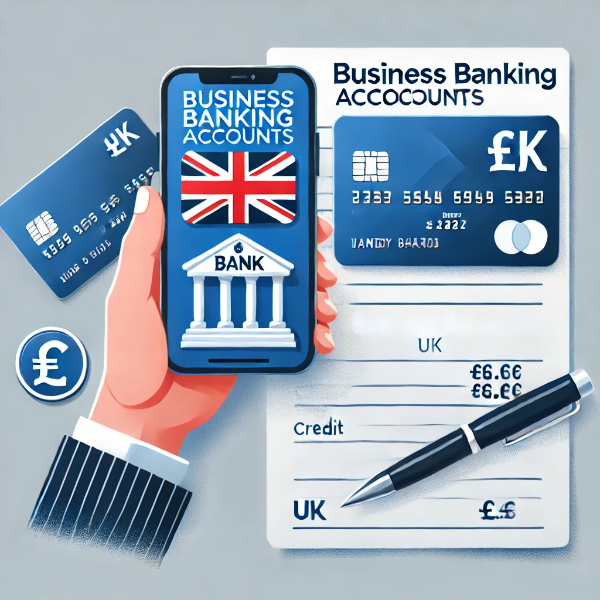Choosing and opening a Business Bank Account in the UK: A Comprehensive Guide
Setting up a business bank account is a pivotal step in establishing a business in the UK. It not only provides a professional image but also helps in maintaining clear financial records and streamlining financial operations. This guide delves into the various options for opening a business bank account, key features to consider, and tips for making an informed decision.
Why You Need a Business Bank Account
Before exploring the available options, it's essential to understand why a business bank account is crucial for business owners:
Separation of Personal and Business Finances: This is vital for accurate accounting and tax purposes.
Professionalism: Having a business bank account adds credibility in the eyes of clients and customers.
Financial Management: It simplifies tracking income and expenses.
Legal Requirements: Business structures like limited companies are legally required to have separate business accounts. While sole traders are not legally required to do so, it is highly recommended for better financial management.

Types of Business Bank Accounts
In the UK, various business bank accounts are tailored to meet different business needs, including:
Startup Business Accounts: Ideal for new businesses with minimal financial history.
Standard Business Accounts: Suitable for most small and medium-sized enterprises (SMEs).
Switching Business Accounts: For businesses seeking to switch from their current bank.
High-Yield Business Savings Accounts: To earn interest on surplus funds.
Key Features to Consider
When selecting a business bank account, several features need consideration:
Fees and Charges: Be aware of monthly account fees, transaction charges, and any additional costs.
Accessibility: Ensure robust online and mobile banking capabilities.
Customer Support: Evaluate the availability and responsiveness of customer service.
Overdraft Facilities: Examine the terms, conditions, and interest rates.
Foreign Transactions: Check fees and services for international payments.
Integration with Accounting Software: Look for compatibility with tools like Xero, QuickBooks, or Sage.
Branch Availability: Consider the convenience of in-person banking.
Top Business Bank Account Providers in the UK
Several banks and financial institutions in the UK offer business banking services. Here’s an overview of some of the top providers:

The information we provide here should give you a good start in your decision making, but Bank offerings change, sometimes frequently. So do do your own reasearch, by visiting the bank website, asking questions, or talking to experts - find out exactly what is right for you.
HSBC Business Banking
HSBC offers a broad range of accounts suited for both startups and established businesses.
Key Features:
- Startup Account: Currently, HSBC offers 12 months of free banking for new businesses.
- Overdraft Facilities: Subject to status and application.
- International Services: Extensive support for businesses involved in foreign transactions.
- Digital Banking: Robust online and mobile banking services.
Lloyds Bank Business Account
Lloyds Bank caters to businesses of all sizes with tailored solutions.
Key Features:
- Free Business Banking for 12 Months: For new and existing businesses.
- Online Banking: Secure and user-friendly.
- Business Support: Access to informative resources and a dedicated relationship manager.
- Payments and Receipts Services: Efficient handling of daily finances.
Barclays Business Bank Account
Barclays is reputable for its strong banking infrastructure and customer service.
Key Features:
- Tailored Account Options: Suited for different business needs.
- Overdraft and Loan Options: Flexible terms.
- Online Banking: Feature-rich and intuitive interface.
- Business Health Pledge: Includes support packages for business resilience.
NatWest Business Banking
NatWest offers a range of business banking accounts with swift setup times.
Key Features:
- 24 Months Free Banking for Startups: Attractive introductory offer.
- Digital Solutions: Including a mobile app and online banking.
- Business Builder Tool: Access to resources and advice for business growth.
- Financial Health Check: Regular reviews to optimise your account.
Santander Business Banking
Santander offers comprehensive and straightforward business accounts.
Key Features:
- Simple Tariffs: Competitive and transparent pricing.
- 24/7 Online Banking: Real-time account management.
- Local Business Managers: Personalised support for business growth.
- International Banking Services: Facilitates overseas transactions.
Metro Bank Business Account
Metro Bank is known for its customer-focused approach.
Key Features:
- Seven-Day Branch Banking: Access to branches every day.
- Instant Account Setup: Open an account and receive a business debit card immediately.
- Cash and Cheque Handling: Convenient for businesses that deal heavily with cash.
- Customer Service: Renowned for high levels of customer satisfaction.
Revolut Business Account
Revolut is a digital-first bank offering innovative business solutions.
Key Features:
- Multi-Currency Accounts: Hold and exchange multiple currencies.
- Business Cards: With spend management features.
- Integrations: Seamless integration with accounting software like Xero, QuickBooks, and others.
- Competitive Fees: Transparent pricing for global transfers and transactions.
Starling Bank Business Account
Starling Bank is lauded for its award-winning digital-first services.
Key Features:
- No Monthly Fees: Free and straightforward banking.
- Real-Time Notifications: Instant updates on transactions and account activity.
- 24/7 Customer Support: Accessible via chat.
- Marketplace Integrations: Integrates with business tools like Xero and FreeAgent.
Monzo Business Account
Monzo is a newer entrant but offers competitive features for SMEs.
Key Features:
- Free and Pro Plans: Flexible plans based on business needs.
- Integrated Accounting: Syncs with accounting software such as Xero and QuickBooks.
- Expense Management Tools: Simplified expense tracking.
- Digital-First Approach: Extensive mobile and online banking.
Tide Business Account
Tide simplifies business banking with its digital-first approach.
Key Features:
- Quick Setup: Account setup within minutes.
- Expense Management: Tools for managing and categorising expenses.
- No Monthly Fees for Basic Account: Transparent pricing.
- Integration with Accounting Software: Works with popular tools like Xero and FreeAgent.

How to Choose the Right Business Bank Account
When selecting the right business bank account, consider these steps:
Assess Your Business Needs: Understand your financial requirements, transaction volumes, and any international dealings.
Compare Features and Fees: Create a comparison chart to weigh the pros and cons of each option.
Read Customer Reviews: Gather insights from other business owners.
Visit Bank Branches or Websites: Evaluate their customer service and digital interfaces.
Consult with Advisors: Seek recommendations from financial advisors or accountants if in doubt.
Types of Banking Comparison
Branch Banking:
- Physical Presence: Requires customers to visit bank premises for transactions.
- Customer Service: Face-to-face interaction with bank staff for account management, queries, and problem solving.
- Security: Personal interaction can reduce certain risks associated with online fraud and verify identity, although branches can still be targets of fraud and theft. Branches often have physical security measures such as surveillance cameras, security personnel, and strict regulatory compliance and internal controls.
- Complex Services: Suitable for complex transactions, such as mortgage applications or financial advice. Some customers may prefer face-to-face interaction for trust and clarity in complex transactions. In-person consultations can also provide immediate clarification and personalised advice. Some banks also offer these services online or via mobile banking with virtual consultations.
- Time-Consuming: Customers need to travel and often wait in queues.
Online Banking:
- Convenience: Access to banking services from any device with an internet connection, including computers, tablets, and smartphones. Can be accessed globally as long as there is an internet connection and from multiple devices simultaneously, providing flexibility.
- Availability: 24/7 access to account information, transfers, and bill payments.
- Security Concerns: Vulnerable to cyber threats like phishing and hacking, but banks use advanced encryption, multi-factor authentication (MFA), and other security measures to protect user data. Banks often monitor accounts for unusual activity and may alert customers to potential fraud. Banks also provide educational resources to help customers recognise and avoid phishing and other cyber threats.
- Limited Personal Interaction: Less direct support compared to branch banking, but often includes online chat support and, in some cases, video calls or virtual meetings.
- Range of Services: Extensive range of services including fund transfers, loan applications, and investment management. Some highly specialised services might still require a branch visit.
Mobile Banking:
- Accessibility: Available through smartphones and tablets using dedicated banking apps for both iOS and Android devices.
- User-Friendly: Often designed with a simplified interface for ease of use on small screens. Apps often include features like mobile check deposit, real-time notifications, intuitive navigation, budgeting tools, multiple language support, and user support features such as FAQs and tutorials. Apps are frequently updated to improve user experience and security.
- On-the-Go Management: Users can conduct transactions and monitor accounts anywhere, anytime, with immediate notifications and alerts to stay updated on account activities in real-time. Mobile banking can also include features like card management (e.g., freezing/unfreezing cards) and transaction categorization for better financial tracking.
- Security Measures: Incorporates mobile-specific security features like biometric authentication, app-specific passwords, encryption, and secure connections to protect data.
- Transaction Limits: May have lower transaction limits compared to branch and online banking for security reasons, though these can sometimes be adjusted by the user within the app settings.
How to Open a Business Bank Account
Opening a business bank account in the UK typically involves these steps:
Documentation: Prepare necessary documents like proof of identity, proof of address, business registration documents, and anticipated turnover. Requirements may differ for sole traders and limited companies.
Application: Fill out the application form either online or in-branch.
Initial Deposit: Some banks may require an initial deposit to activate the account.
Verification: The bank will verify the submitted documents and might ask for additional information, with the process duration varying.
Account Activation: Once approved, your account details and banking facilities will be provided.
